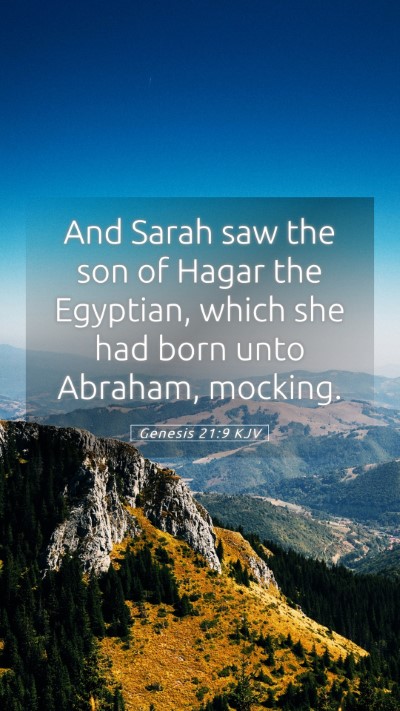Understanding Genesis 21:9
Genesis 21:9 states, "And Sarah saw the son of Hagar the Egyptian, which she had borne unto Abraham, mocking." This verse presents a pivotal moment in the narrative of Abraham's family and addresses themes of conflict, jealousy, and the consequences of human actions.
Bible Verse Meanings
In this passage, Sarah observes Ishmael, the son of Hagar, mocking her son Isaac, which ignites a deep-seated conflict. This scene exemplifies the tension between the two mothers, highlighting the consequences of Abraham's prior decisions regarding Hagar and their offspring. The mocking signifies not just a childish taunt but also possibly an underlying hostility that reflects the broader issues surrounding Abraham's family dynamics.
Bible Verse Interpretations
Commentary by Matthew Henry emphasizes the importance of the familial relationships at play, noting that the tension arises from the fulfillment of God’s promise to Abraham through Isaac and the jealousy provoked by Hagar's son. Albert Barnes adds that this mocking could be seen as an act of derision, showcasing the strife between those within the household of promise and those outside of it.
Key Insights from Commentaries
-
Matthew Henry: Highlights the emotional turmoil faced by Sarah as the mother of the promised child, Isaac, underscoring her protective instincts towards her son.
-
Albert Barnes: Discusses the broader implications of the conflict, suggesting that Ishmael's mockery symbolizes the opposition faced by the faithful in God's promises.
-
Adam Clarke: Offers an interpretation about the nature of Ishmael's mockery, linking it to the future enmity that would characterize the descendants of Isaac and Ishmael.
Bible Verse Understanding
The observation made by Sarah encapsulates the struggles that arise in families when promises and expectations collide with reality. Ishmael's mocking serves as a flashpoint for Sarah to realize that the presence of Hagar and her son poses a threat to her son Isaac. Thus, this moment leads to decisions that set important legal and relational precedents in the Biblical narrative.
Bible Verse Explanations
This verse’s significance extends beyond mere family dynamics. It calls into question the nature of God's promises and their fulfillment in the face of human error. The mocking can also be interpreted as a cultural and religious challenge, symbolizing those who do not belong to the covenant. This rich narrative invites readers into deeper scripture analysis and encourages reflection on the broader implications of familial and societal relationships in light of divine promises.
Application of Genesis 21:9
For modern readers, this verse serves as a reminder of the consequences of our decisions and actions within familial realms. In moments of conflict, it encourages individuals to seek understanding, resolution, and connection, rather than allowing jealousy or derision to dominate. The teachings of this passage promote discussions in Bible study groups regarding the universal themes of conflict resolution and the importance of nurturing legacy through faithfulness to God’s promises.
Cross References
- Genesis 16:4 - The beginning of the conflict due to Hagar bearing Ishmael.
- Galatians 4:29 - Paul references this mocking to discuss the allegory of the two covenants.
- Genesis 21:10 - Sarah's demand to cast out Hagar and her son indicates the severity of familial conflict.
Further Study
This verse can be elaborated upon through online Bible study tools, which offer insights into cross-referenced scripture and thematic analysis. Understanding the historical context of Genesis 21:9 is essential for deepening one's biblical exegesis, as it illuminates the complexities of human relationships forged in the backdrop of divine intention.
Conclusion
The excerpt from Genesis 21:9 thus serves as a reflective piece for anyone engaging in scripture analysis or seeking to grasp the intricacies of God’s covenant. By studying Sarah's reaction and Ishmael’s mocking, we are invited not only to learn about biblical family dynamics but also to consider the broader implications of our choices and the enduring nature of divine promises.


